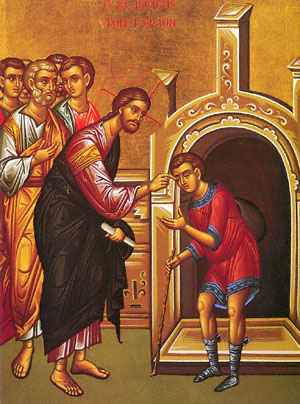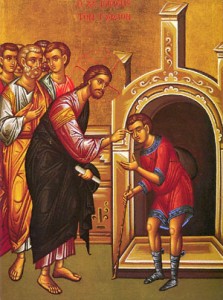Read John 9:1-38
A long time ago, in a writing class I was in, the teacher said that every good story has a hero and an antagonist. In the Gospel story from the 9th chapter of John presents just that the hero, the blind man or perhaps Jesus (although he is the hero of all biblical stories) and the Pharisees.
Jesus and walking along the road and he meets a man that has been blind since birth. Biblical commentators say that the man is known to Jesus and his Apostles and would have known his story and that he was blind from his birth. Being blind from birth is essential to the story as sometimes there was a question about healing and the fact that perhaps the person was not sick. In any case, the Apostles asked who had sinned the man or his parents.
The ancients believed there was a direct correlation between sickness and sin. In some way, this might be true. When we sin we do not always make the best choices, and this can lead to severe consequences but, in this case, since the man was born this way, it is unlikely this happened. However, Jesus provides us with the answer in verse 3, “Neither this man nor his parents sinned, but that the works of God should be revealed in him.”
Jesus makes clay with some of his spit; this harkens back to the creation of the world and put the clay on his eyes. He then directs the man to go wash in the pool of Siloam, which was located quite a distance from the Temple. The man had to participate in the gift that Jesus was giving him. Sure Jesus could have just healed the man, we see this on several occasions, but he asked the man to participate in his healing as a way to show us that we too need to take part in our healing.
Now this is where the story gets good.
Later on the man’s neighbors see him and they start to ask if this was indeed the man who had been born blind. He tells them that yes it is he, and they ask how he was healed. He tells them the story of Jesus; he is evangelizing his neighbors, and they were so interested in the fact that their friend could now see that they take him to the Pharisees.
The Pharisees question the man about his healing and when they discover that it was Jesus, who they apparently knew about by this point in His ministry, and when they realized that it had been done on the Sabbath they become enraged. It was unlawful to perform any work on the Sabbath and the action of Jesus “making the clay” was considered work. Since he broke the Sabbath, he was. Therefore, a sinner and this “healing” could not have been from God.
The bring in the man’s parents to verify the story and the parents tell the Pharisees that he was in fact born blind, but they have no idea how he was healed in fact they tell the Pharisees that the man in “of age” go and ask him. They were so terrified of the Pharisees and being thrown out of the Temple, that they were willing to sacrifice their son! This is what religion can do.
So they bring in the man again and ask him for his healing. The man answers that he had already told them what had happened in fact he scolds them because they did not listen the first time. I am sure that went over well with them. He then asks them if they too wish to become a disciple of Jesus. Well this sets them off, and they become indignant and they proclaim that they follow Moses, they condemn the man and cast him out of the Temple.
The Pharisees were the truly blind ones in this story. Their lack of faith so blinded them; their hatred of Jesus so blinded them, their fear of Jesus so blinded them and perhaps their loss of position, which they missed the miracle for the rule. The law said you cannot work on the Sabbath, and that is all they were able to see. A man who had been blind from birth had received his sight and had been made whole and rather than giving God the glory and rejoicing they were giving the law the glory and used it to condemn not only Jesus but the poor man who had been healed.
This happens more than we would like to think it does in the church today. We get so caught up in the rules and the laws that we forget about the people. We see their sin, and not ours by the way, and all we wish to do in condemn them for it. We enshrine the law in gold and use it a weapon against the people. We cast them out, maybe not as the Pharisees did in the story, but we cast them out with our words and with our actions.
But the story does not end there. Jesus finds the man and asks him what happened and asks the man if he believes in the Son of God. The man asks who he is that he might believe in him. Jesus responds that it is himself, and the man believes. Jesus responds in verse 39, “For judgment I have come into this world, that those who do not see may see and that those who see may be made blind.” Blinded by the law they threw out a man who could see because of his faith.


